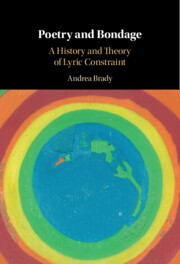Book contents
- Poetry and Bondage
- Poetry and Bondage
- Copyright page
- Dedication
- Contents
- Illustrations
- Acknowledgements
- Introduction The Fetters of Verse
- Part I Lyric Cells
- Chapter 1 The Music of Fetters
- Chapter 2 The Ligature
- Chapter 3 Each in Their Separate Hell
- Chapter 4 Hours of Lead
- Part II The Songs of Slavery
- Part III Pleasures and Ornaments
- Index
Chapter 2 - The Ligature
Rob Halpern’s Common Place and the Limits of Desire
from Part I - Lyric Cells
Published online by Cambridge University Press: 08 October 2021
- Poetry and Bondage
- Poetry and Bondage
- Copyright page
- Dedication
- Contents
- Illustrations
- Acknowledgements
- Introduction The Fetters of Verse
- Part I Lyric Cells
- Chapter 1 The Music of Fetters
- Chapter 2 The Ligature
- Chapter 3 Each in Their Separate Hell
- Chapter 4 Hours of Lead
- Part II The Songs of Slavery
- Part III Pleasures and Ornaments
- Index
Summary
The lyric habits developed by Wyatt can be traced into the twenty-first century, where they also structure a series of erotic addresses to a detainee in Guantánamo Bay by the American poet Rob Halpern. Halpern’s book Common Place shows how the attempt to project a loving relation into the military prison can become complicit in the erotic objectification of the other. Constraining himself through the act of transcribing the autopsy report released by the US military following the detainee’s suicide, Halpern’s queer subject appropriates an absent victim who has been hunted down and trapped by the sovereign. And while he attempts to oppose erotic love to militarised violence in order to imagine the possibility of relation at the site where relation is banned, his book objectifies the inaccessible beloved in ways that resemble Wyatt’s politicised negotiations with the Petrarchan tradition. The continuities between Wyatt and Halpern are exemplified by the collar or ligature wrapped around the neck of Wyatt’s hind, and of the detainee.
- Type
- Chapter
- Information
- Poetry and BondageA History and Theory of Lyric Constraint, pp. 60 - 82Publisher: Cambridge University PressPrint publication year: 2021



